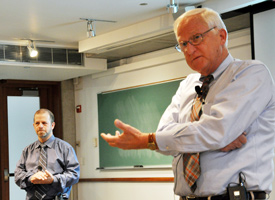The Road to Success: Lecture Series Kicks Off with Stories of Two Sold Startups
Gregory Olson, Michael Peshkin discuss entrepreneurship in first Farley Fellows lecture
Watch Olson and Peshkin's presentations.
When McCormick’s Michael Peshkin started a medical robotics company with one of his graduate students almost 20 years ago, he had no idea what headaches awaited them. Patent issues, a fired CEO, crippling investor demands, and so little income that employees were working for free — for a long time, the company seemed a lost cause.
But the scrappy startup eventually found great success. Last month, the medical technology company Stryker Corporation bought the company, renamed as MAKO Surgical, for $1.65 billion.
Northwestern faculty and students heard Peshkin’s story October 15 in a new lecture series sponsored by Northwestern’s Farley Center for Entrepreneurship and Innovation. The lectures invite Farley Fellows, faculty members who have been particularly successful in entrepreneurship, to share their experience with the Northwestern community.

The first Farley Fellows seminar featured Peshkin, professor of mechanical engineering and Charles Deering McCormick Professor of Teaching Excellence, and Greg Olson, Walter P. Murphy Professor of Materials Science and Engineering, both in Northwestern University’s McCormick School of Engineering and Applied Science.
After MAKO, Peshkin went on to co-found three more startups to commercialize Northwestern developments in human/robot interaction: Tangible Haptics, a company that “lets you feel what you see” on touchscreens; Kinea Design, a developer of robotic and mechatronic assist devices for physical therapy; and Cobotics, Inc., a provider of intelligent assist devices to the industrial marketplace.
Two of the other companies have also been purchased, often considered a marker of a startup’s success. But Peshkin says the startup world is exciting for reasons other than money.
“The joy is in the pursuit,” he said. “It is a great experience, and you have a chance to change the world.”
Olson also experienced considerable success with the sale of his company, QuesTek Innovations. Founded in 1996 by Olson and his former PhD student, QuesTek uses Integrated Computational Materials Engineering (ICME) to create patented materials on the atomic level, designing and developing new advanced materials in less than half the time and a third of the cost of traditional empirical methods.
In the mid-1990s, Olson’s lab was offering a technology that most people thought wasn’t possible. This prompted Olson to consider taking his work outside the lab and into the marketplace.
“There’s only so much impact you can hope to have writing papers in an ivory tower, especially if your area of focus is technology,” he said. “The only way to get it out there is to start a company.”
QuesTek grew, creating products like high-performance steel for the US Navy, Army, and Air Force; in 2010, the first ever ICME-designed and qualified material (QuesTek’s Ferrium® S53® steel) began flying as the main landing gear on a T-38 trainer jet. Two of its steels are being evaluated by the world’s largest military helicopter manufacturers (Bell Helicopter, Boeing and Sikorsky) as next generation flight-critical transmission components, displacing steel that has been used for decades.
In 2012, a major Silicon Valley company acquired a portion of QuesTek’s materials design team, but Olson and his partners retain the rights to the intellectual property. Since then, QuesTek has hired a number of new engineers and materials designers, and they continue to win new projects, funded both by the government and private industry.
“It’s a great opportunity to hire my former and current students,” Olson said.